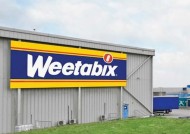 To enable further expansion, The Weetabix Food Company decided to invest in a state of the art pallet warehouse. TGW was awarded the design and integration of this warehouse solution.
To enable further expansion, The Weetabix Food Company decided to invest in a state of the art pallet warehouse. TGW was awarded the design and integration of this warehouse solution.
From its base in the heart of the English countryside, The Weetabix Food Company has been creating delicious breakfast cereals since 1932. The business has expanded significantly since its creation and the company now employs over 2,000 people around the world. Weetabix unique range of breakfast cereals isn’t just popular in the UK – they export to over 80 countries, from the Middle East and South America to Europe and South East Asia.
To free up space within the existing warehouse complex at the Weetabix headquarters in Burton Latimer, Northamptonshire, and to reduce the number of pallets currently held in off-site storage, the company decided to invest in an automated storage and retrieval system (AS/RS). TGW Limited has designed and integrated the new automated warehouse solution into the existing operation.
TGW Solution
“If I ask myself, why did we do this project – the business undertook a strategic review of its operations and one of the work streams came up with warehouses as a significant bottleneck going forward, given our growth plan. So the business had engaged with a number of OEMs to propose with us what a good operating solution would be for a long time plan. Now we can see the end result of that project”, says Damian Magill, Chief Engineer.
TGW designed a cost effective solution for Weetabix, where the pallets are conveyed and handled two pallets high, to optimise throughput and space. There are 22,000 pallet locations in the warehouse, serviced by three highly dynamic fully automatic TGW Magnus pallet handling cranes, supplying multiple pallet deep storage tubes with the TGW Muli satellite vehicles. This new solution allows for a performance of storing and retrieving approximately 200 loads per hour.
“The key advantages of adopting an AS/RS system for Weetabix has been pretty significant for us. First, TGW was able to maximise our footprint by the use of the intelligent Muli system which minimised the amount of monorail-crane systems in the installation. We will operate with three, whereas traditionally the systems have as many as five or six. We have taken the available pallet storage from circa 12,000 pallets to 22,000 pallets within the same footprint, a very significant increase.”
TGW deployed a load recovery access system, which allows safe access for this type of application, for qualified operators to enter the storage tubes to recover a failed or damaged load. The access system is also used in support of the maintenance and health and safety activity. The combination of TGW Magnus ASR machines and the Muli satellite vehicles is used to deliver and recover the access cages into and from the storage tubes. The entire solution has been integrated into the existing facilities at the Weetabix headquarters in Burton Latimer. “We’ve not had to build another building to accommodate the project, we have integrated it into the existing operation, which has been a challenge but a very rewarding experience.”
To allow the current operations to continue whilst the new solution was installed, TGW phased the installation works and coordinated every step of the realisation and transition with the on-going live operations. From November 2010 the new warehouse solution has supplied customers around the world with the Weetabix Family of Brands.
“What makes these things happen is creating a partnership with the OEM, and we have been able to do that successfully with TGW UK. The team of Weetabix and the team at TGW have responded well to whatever challenges have come our way. These things always have issues, but the measure is how you deal with those issues, and that has been a very positive experience. The design is very robust, we are seeing really good performance. I am pleased to say that thus far, we are very pleased with the investment that was made with TGW.”
TGW Logistics Group




Comments are closed.